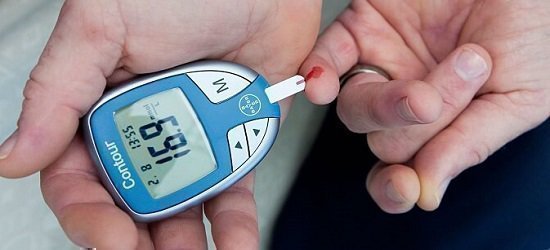Can blood sugar rise due to nervousness? Yes, it can, because in the human body everything is interconnected and intertwined. And if an increase in sugar affects the functioning of the nervous system, then, accordingly, the state of the nerves and the presence of stress also negatively affect the endocrine system, and in particular, the production of insulin.
And adrenaline, the stress hormone, ensures such a stable relationship between the nervous and endocrine systems. Its production increases when a person experiences fear, pain, or is nervous. Under the influence of adrenaline, blood pressure increases.
How does adrenaline work in the human body?
Adrenaline is considered a catabolic hormone, that is, a hormone that affects all metabolic processes, including increasing blood sugar levels. How?
It uses additional mechanisms in the body that cause sugar to rise, and at the same time, means that process this sugar into energy.
Adrenaline first delays the synthesis of glycogen, preventing the increased volume of glucose from going into “reserve”. This process occurs in the liver.
Enhances the process of glucose oxidation, which results in the formation of pyruvic acid and the release of additional energy. If energy is used by the body to perform certain work, then sugar quickly returns to normal. It's being used up. It is the release of energy that is the main task of adrenaline. With its help, a person, experiencing fear or nervous excitement, does something that he would not be able to do in a normal state.
Adrenaline and insulin are antagonist hormones. Under the influence of insulin, glucose is converted into glycogen, which accumulates in the liver. Under the influence of adrenaline, glycogen is broken down, turning into glucose. Thus, adrenaline suppresses the action of insulin.
Prevention of stress hyperglycemia
Hyperglycemic attacks caused by emotional experiences and accompanying complications (myocardial infarction) can be prevented by a healthy lifestyle. If glycemia rises sharply, it is necessary to follow the treatment algorithm drawn up by the doctor. Complications can be cured if they are detected at an early stage.
Advice! Early diagnosis of diabetes (during or outside of pregnancy) helps prevent further increases in glycemia. It is recommended to treat hyperglycemia under the supervision of a doctor. If there is strong emotional stress, the patient (child or adult) may require tranquilizers. Some of them can increase glycemia, so it is necessary to follow the recommendations of a qualified specialist.
source
Effect of cortisol on glucose production
Cortisol is another hormone that the body produces through the adrenal glands. Under the influence of oppressive stress or anxiety, the level of cortisol in the blood increases. Its effect on the body is longer lasting, and one of its functions is the production of glucose from the body’s internal reserves. Cortisol produces sugar from non-carbohydrate substances present in the human body, slows down the accumulation of sugar in cells, and stops the breakdown of glucose. Thus, this hormone causes the concentration of sugar in the blood to increase.
When stress, worries, and anxieties become constant and daily, turning into a way of life, adrenaline and cortisol are constantly present in the body in increased quantities, forcing the “glucose reserves” to work. The pancreas does not have time to produce insulin. Insulin is produced, but cannot affect the glucose produced by cortisol. A failure occurs that leads to a systematic increase in blood sugar and diabetes.
The appearance of diabetes is also a consequence of a decrease in the functioning of the immune system, which is also provoked by cortisol.
Should you give free rein to your emotions?
It’s good when the production of stress hormones is aimed at overcoming obstacles. But what happens when a person experiences psycho-emotional stress? Cortisol, together with adrenaline, raises blood glucose levels, which are converted into pyruvic acid, releasing energy. Fights and scandals with breaking dishes and shouting are an opportunity to use the energy generated in the body.
But if the energy does not find a way out, if a person experiencing a psycho-emotional surge restrains emotions within himself, the process of converting pyruvic acid into glucose occurs in the reverse order, with the absorption of energy. Thus, blood sugar increases during stress. This is why doctors and psychotherapists do not recommend restraining yourself when under stress.
While a person is young and healthy, these situations do not have a serious impact on the body. But the destructive effect of frequent psychological disorders occurs, and becomes more noticeable with age. Ultimately, if the appropriate prerequisites are present, diabetes mellitus develops due to nervous conditions.
A person is capable of regularly provoking the release of stress hormones, as they say now, by working himself up, taking everything to heart. Day after day, cortisol is released into the blood when you
- you worry about your children, often in vain,
- you suffer for the dead,
- you experience a gnawing feeling of jealousy and self-doubt.
Afobazole, other sedatives and hypnotics for diabetes
During times of stress, diabetics often have trouble sleeping. To combat anxiety, doctors recommend taking sleeping pills and sedatives. One of the popular medications is Afobazol .
The remedy is indicated for disorders of the nervous system, headaches, increased irritability and anxiety, fatigue and other consequences of strong experiences.
Afobazol tablets
Afobazole, unlike a number of other drugs, is allowed to be taken for arterial hypertension and cardiac ischemia. If for some reason a diabetic is unable to take these pills, they should be replaced with medications that are similar in composition and therapeutic effect.
The only analogue of Afobazole is Neurofazol. But treatment is carried out by placing droppers (which is not always convenient for the patient).
The following tablets have a similar effect on the body:
- Phenibut;
- Divaza;
- Adaptol;
- Mebiker;
- Fesipam;
- Tranquesipam;
- Strezam;
- Elzepam;
- Tenoten;
- Noofen;
- Phenorelaxan;
- Phenazepam.
The drug Novo-Passit is considered safer. It contains St. John's wort, guaifesin, valerian, lemon balm and a number of other herbs with a calming effect.
The medicine perfectly helps with insomnia and relieves anxiety. The advantage is speed, efficiency and safety. The downside is the appearance of daytime sleepiness.
How to fight
Now that you know that the effect of stress on blood sugar levels in diabetes is much stronger than in a healthy person, when you understand that stress could be the cause of your disease, analyze your life. Maybe there was and continues to be some negative factor in your life that is poisoning your life?
Tip 1
You can, of course, swallow handfuls of medicine, lie in the hospital for months on IVs, or you can develop a healthy indifference. I apologize for the jargon, but the word indifference does not reflect the essence of what was said. Some shade is missing.
It is important to understand for yourself that if your loved ones are indifferent to this or that condition, if they do not understand that with their thoughtless actions they make you nervous and worried, then you too become a little more indifferent to them.
Let them do what they want. You can't change adults anymore.
Tip 2
Age-old wisdom says: if you cannot change your circumstances, change your attitude towards them. Positive thinking will help you cope with stress. A simple example. Stuck in a traffic jam. There are two scenarios for the development of events:
- You can be nervous, imagining how you will be scolded for being late, smoking one cigarette after another;
- Or you can call and say that you are stuck in a traffic jam, and while sitting in the car, do something fun and useful: look at reports or other news online, chat with nice people, learn a foreign language. This switching of attention will allow you to calm down and not experience unnecessary negative emotions.
The more often you switch your attention in this way, rearrange yourself in accordance with circumstances that you cannot change, the slower you will age, producing unnecessary cortisol, which is also called the death hormone.
Tip 3
Don't forget to rest. Give rest not to your arms or legs, but to your soul. Good calm music, humorous programs, and interesting books help to distract from gloomy thoughts. Avoid watching news, especially crime, and aggressive films. Take every opportunity to get out into nature.
It is difficult to imagine modern life without stress and situations that provoke it, and these factors can trigger diabetes. Stressful situations literally “lurk” a person in everyday life: in relationships, at work, in transport, in a government environment, etc. And every person needs to know that emotional stress seriously worsens health. Therefore, it is important to be able to control negative aspects and be able to cope with them.
IT IS IMPORTANT TO KNOW! Even “advanced” diabetes can be cured at home, without surgery or hospitals. Just read what Marina Vladimirovna says and read the recommendation.

How does stress affect the body?
The main role in the development of type 2 diabetes is played by hereditary factors with a probability of up to 90%. For type 1 diabetes, this risk is much lower and amounts to 50%. Under the influence of associated negative factors, complex chemical processes occur in the body, which subsequently leads to the development of a life-threatening disease.
Sugar goes down instantly! Diabetes over time can lead to a whole bunch of diseases, such as problems with vision, skin and hair condition, the appearance of ulcers, gangrene and even cancerous tumors! People who have learned from bitter experience use it to normalize their sugar levels. read more.
With a hereditary predisposition to the disease, stress loads have a special impact on the formation of the disease. Against the background of a stressful situation that is repeated systematically, the likelihood of developing type 1 and type 2 diabetes mellitus increases. In sick people, emotional shocks aggravate their health and lead to negative consequences.
As a result, chronic emotional stress can cause malfunction of many organs and develop life-threatening diseases. Negative impacts on human health:
- disruption of the endocrine glands;
- provoking kidney diseases;
- disorders of the heart and blood vessels;
- vein diseases and leg problems;
- blindness;
- deterioration of the immune system;
- stroke.
Return to contents
Chronic stress
If a person has experienced a short-term stressful situation, the body recovers. This is typical for a healthy person, but with diabetes or prediabetes, prolonged overexertion affects health.
- cardiovascular diseases,
- diabetic nephropathy develops,
- immunity weakens,
- sleep disturbance,
- renal failure develops.
An increased concentration of stress hormones enhances the work of the pancreas, converting glycogen into glucose. Working the pancreas in this mode exhausts the organ. Therefore, a person needs hypoglycemic drugs. It is important to adhere to a special diet, engage in moderate physical activity, and sometimes the doctor can give advice on how to cope with stressful situations.
Stress control and relief
It is impossible to completely prevent emotional upheavals. But it is quite possible to minimize stress, thus eliminating the factor that triggers the formation of diabetes. Methods for relieving stress include physiological and psychological techniques. Maintaining an active lifestyle, healthy physical activity, and the ability to cope with emotions and “release” them rather than accumulate them help combat the negative impact of stressful situations.
To prevent an increase in blood sugar levels, and subsequently insulin levels, it is important to adhere to the following recommendations:
- practice yoga and conduct meditation exercises;
- try exercises aimed at alternating tension and relaxation of various muscle groups;
- take a contrast shower;
- learn to analyze stressful situations and practice liberation from excess emotions;
- find a relaxing hobby that has a positive effect on your health.
Any form of physical activity helps you cope better with stress. For people already suffering from diabetes and those who are at high risk of developing the disease, it is important to maintain a healthy rhythm of life and cultivate an optimistic outlook on the world. This life position will help diabetic patients smooth out the negative symptoms of the disease and minimize the likelihood of complications. For those who are at risk, this will help avoid the disease. In any case, such a lifestyle will be useful to any person who is conscious about their health.
Prevention of stress hyperglycemia
It is impossible to completely protect yourself from such conditions. But it is necessary to monitor the situation to prevent the development of the disease or to control unexpected surges in sugar in diabetes. To understand how stress affects health, a patient with diabetes needs a clear example.
After every unpleasant or conflict situation, it is worth measuring your sugar using a glucometer. The data is entered into a special diary. Next, you need to compare the degree of tension and glucose levels. It is very important to track how the body reacts to a particular psychological technique. Here, to determine, you also need to measure indicators and record them in a diary.
Physical activity is considered an effective way to neutralize stress hormones. This is explained by the fact that cortisol and adrenaline are produced by the body precisely for these purposes. The exercise doesn't have to be grueling. Walking at a moderate pace for 45 minutes is enough. During this time, hormones will return to normal.
There are also other approaches to relieving tension. One of the behavioral tactics is the release of emotions. A patient with diabetes needs to lead an active lifestyle and avoid passivity and despondency. Almost all types of physical activity reduce blood glucose levels and at the same time reduce tension and help overcome stress.
Recommended activities include:
- practice meditation and yoga;
- visit a psychologist, psychotherapist, psychoneurologist for a long-term depressive state;
- take medications depending on your mental state - sedatives, antipsychotics, anti-anxiety drugs;
- pick up a relaxing hobby;
- carry out exercises of alternating tension and relaxation of different muscle groups.
You can buy sedatives without a prescription. Sedafiton, Novopasit, Persen, Glycine will help you cope with anxiety. Many antipsychotic and anti-anxiety medications are available by prescription. They are prescribed mainly by neuropsychiatric doctors.
Physiotherapeutic procedures are used to relieve tension. The most popular are pulsed currents, acupuncture, and circular showers. They help reduce the production of cortisol, adrenaline, and nordadrenaline.
It is important not to focus on the problem and your experiences. If the situation cannot be changed or anxiety cannot be avoided, you need to switch your attention to something positive or something that evokes pleasant emotions. It is also necessary to select literature and films that do not create tension and excitement. You should avoid news and other crime television programs. It is better to spend your leisure time with humorous shows, comedies and interesting books.
Anxiety has a direct effect on glycemic levels in patients with diabetes. In stressful situations, sugar spikes can be unexpected. It is important to learn to control your emotions to prevent stress hyperglycemia.
source
Do you still think that it is impossible to cure diabetes?
Judging by the fact that you are now reading these lines, victory in the fight against high blood sugar is not yet on your side.
Have you already thought about inpatient treatment? This is understandable, because diabetes is a very dangerous disease that, if not treated promptly, can be fatal. Constant thirst, frequent urination, blurred vision. All these symptoms are familiar to you firsthand.
But perhaps it would be more correct to treat not the effect, but the cause? We recommend reading the article about modern methods of treating diabetes. Read the article >>
Stress is an unfavorable factor that provokes many diseases of different organ systems. Experts say that nerves can even cause diabetes.

How stress affects blood sugar
Blood sugar levels can spike during stress. This happens in a matter of minutes. If this is normal for a healthy person, then for a diabetic it is a real tragedy. Such a critical condition can lead to negative consequences, for example, hyperglycemia. The person may fall into a coma or die. That's why you need to know how stress affects your blood sugar levels and understand what consequences this can lead to.
Nerves and diabetes - can sugar rise from nerves?
Stress is the body’s natural reaction to excessive tension or any negative emotions.
In addition, stress, aggravated by nervous tension, means not only anxiety, but also recovery after operations, serious illnesses, in which the nervous system also suffers.
In general, nervous shock can increase blood sugar levels and influence the development of diseases such as diabetes.
Restoration activities
In the case where blood tests show an increased blood sugar ratio, it is necessary, first of all, to eliminate the source of the situation presented.
Next, you will need to completely eliminate any nervous costs and worries. An equally significant stage of the recovery course should be considered the transition to a special diet.
This is what is recommended for prediabetes and involves avoiding eating sweets, fatty foods and dishes.
From the moment of switching to such a modified diet, at least three months must pass before it is possible to talk about any results and dynamics.
It is after the end of this period that you will need to take a blood test to check for the presence of sugar in it.
In addition, another measure within the framework of the recovery course should be considered constant monitoring of weight and trends in the issue of increasing or decreasing body weight.
At the same time, taking into account all the characteristics of the body in each specific case, it will be very important to get an answer to the question whether the sugar level can rise from the nerves. In some cases, this happens really quickly, and it is these people who are more at risk of developing diabetes. For them, restoration measures should be the most complete.
It is entirely acceptable to study techniques that will allow you to further relax and take your mind off the influence of any stress factors. Speaking about this, pay close attention to:
- special respiratory exercises;
- playing your favorite sport;
- relaxation.
A new hobby may be the right choice, which, like all other techniques, will make it possible to stabilize the general state of mind. This will also make it possible to prevent the human body from developing a pathological condition. When discussing whether the indicators can rise, I would like to draw attention to the significance of some additional information.
The effect of stress on sugar levels
Nervousness occurs in people against the background of prolonged nervous tension or as a result of particularly strong emotions. Often stress appears just like that, when a person gets tired of the gray, identical everyday life.
How does it affect blood sugar levels? There is a popular belief that blood sugar only decreases under stress, so there is no need to worry. But medical research has shown that all kinds of experiences affect blood glucose levels differently. It is because of them that diabetes mellitus arises from nerves, because regardless of the scale of stress, blood sugar can only rise. If in a healthy person nothing changes along with an increase in this indicator, then for diabetics such a sharp jump can result in death without a timely injection of insulin. Many diabetics ask whether it is possible to replace insulin with other available means.
Stress in diabetes
As it turned out, with a prolonged state of anxiety and crisis, the level of glycemia increases.
Gradually, the resources of the pancreas begin to deplete. As a result, diabetes begins to progress. To maintain optimal sugar levels, not only hypoglycemic agents play a role. A special diet and physical activity are prescribed. The patient is also given recommendations regarding stressful situations.
When worried and nervous, the patient has difficulty managing diabetes. Taking into account correctly selected therapy, indicators may increase, and a decrease in the effectiveness of medications may be observed.
Particular attention is paid to depression on the course of the disease in adolescents. At this age, sugar spikes can occur from the slightest unstable situations. In addition, controlling glycemic levels during emotional stress in adolescents with diabetes is more difficult. The psycho-emotional state during the transition period and puberty is taken into account. This situation requires a special approach. To relieve tension, you may need the help of a psychologist.
Video from Dr. Malysheva:
How to lower blood glucose levels during stress
With nervous tension, blood sugar rises, so it is necessary to take special measures to reduce it. If you do not follow this rule, you can quickly develop diabetes.

Blood sugar test
If a blood test shows a high level of glucose in the blood, you should try to remove the source of stress that caused such an outbreak in the body as quickly as possible. In this case, the patient must be kept as calm as possible so that he does not become nervous again.
If your experiences are accompanied by an increase in sugar levels, you should pay special attention to your diet. It is necessary to follow a strict diet that contains a minimum amount of fat and carbohydrates. Only a specialist can prescribe it.
Typically, when blood sugar levels increase, your heart rate also increases. If there is none, you should once again make sure that it is stress that is the source of your problem. Sugar levels often change due to changes in body weight, so people who are prone to being overweight or losing weight should monitor the dynamics of their weight.
If blood sugar has increased and stress continues to affect the body, the patient should be relaxed as much as possible. To do this, there are methods to relax a person and distract him from troubles. It could be:
- relaxation;
- yoga;
- playing sports;
- walks in the open air;
- other interesting activities.
Increased sugar levels due to a nervous background in a diabetic
Many patients ask the question: “Can glucose levels rise in diabetics?” Experts answer this question in the affirmative. This happens according to the same principle as in healthy people. But it is much more difficult for diabetic patients to deal with this. All operations must be performed under the supervision of a specialist. In especially serious condition, diabetics have no chance to resist this destructive process.
There are some procedures that can at least slightly change the patient’s plight. If you don't start using them, a lot of problems may arise:
- disruption of the circulatory system of organs;
- dysfunction of the excretory system;
- development of diseases of the lower extremities;
- increased likelihood of developing a stroke;
- development of blindness.
Researchers from Britain have found that in diabetics, a sharp rise in blood sugar can lead to memory loss. As a preventative measure, professionals recommend using mineral preparations containing zinc. This element allows you to control blood sugar levels. It also plays the role of an assistant in the process of insulin production, which is important for such patients.
Diabetes and stress are incompatible concepts. Any person suffering from such a disease should be protected from stress and depression, since nervous tension can have a lot of unpleasant consequences for him.
Questions for the doctor
Yulia Nikolaeva, 52 years old, Saratov Good afternoon. About two weeks ago I received an injection of Diprospan to relieve pain in my leg. On this day, my blood sugar rose to 13, despite the fact that I do not have diabetes, or I really hope so. In the first week, the figure ranged from 9 to 13 mmol/l, depending on the interval between meals. After 2 weeks, the levels returned to normal slightly, before meals – 4.2-4.6, but after meals there was a jump again – 7-8 mmol/l. I am diagnosed with chronic pancreatitis, but I have never felt such indicators, I didn’t measure them at all after eating, everything was always fine before eating. Has the injection really become a fatal starting point for diabetes? I'm very worried, what should I do?
Good afternoon. Yes, glucorticoids have the ability to increase blood glucose levels. After administration, this effect can last for 3 weeks; the instructions warn about prolonged action. To reassure yourself, get tested for glycated hemoglobin - this indicator will help identify hidden diabetes. Remember also that such jumps have become a powerful psycho-emotional factor for your body, pay attention to stabilizing your well-being.
Marina, 32 years old, Kirovsk Good afternoon. I took a test for glucose tolerance, but I can’t turn to a specialist for a transcript yet. The sugar level in the morning on an empty stomach is 5.56, 2 hours after taking the mixture – 8.1. Glycated hemoglobin – 5.5. Tell me, is this prediabetes?
Good afternoon, Marina. Prediabetes is not visible from the test results. Impaired glucose tolerance is noticeable. Tell me, were measurements taken an hour after taking glucose? This disorder can be corrected with medication, but consult a doctor to prescribe therapy.
Tatyana, 26 years old, Izhevsk Good afternoon, I have doubts about a certain issue, and I am asking for help. Now I am 20 weeks pregnant, I regularly undergo examinations and donate blood for sugar levels. Indicators are 5.4 - 6.1 on an empty stomach and more than 7 after eating. The glucometer at this time shows 6.2. The doctor says that the readings are bad and recommends insulin, I, in turn, am on a diet because I am afraid of hypoglycemia. Do you need insulin?
Good afternoon, Tatyana. Glucometer readings should not be taken into account when having the results of blood tests from a vein. Blood sugar on an empty stomach should be no more than 5.1 mmol/l, and after eating no higher than 7 mmol/l.
In your case, the diet is not effective, violations are present and insulin is needed. The dose should be adjusted in a hospital setting to prevent the development of hypoglycemia. Elevated sugar is dangerous not only for you, but also for the child; the price of refusing insulin can be high.
source








